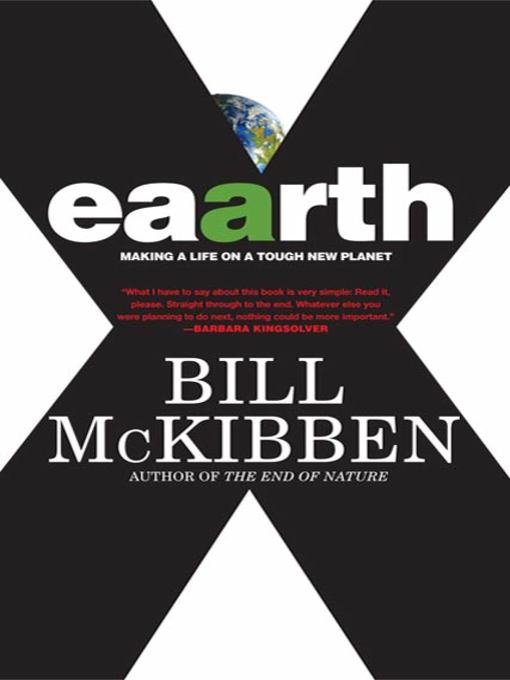
Eaarth
Making a Life on a Tough New Planet
کتاب های مرتبط
- اطلاعات
- نقد و بررسی
- دیدگاه کاربران
نقد و بررسی

December 21, 2009
The world as we know it has ended forever: that's the melancholy message of this nonetheless cautiously optimistic assessment of the planet's future by McKibben, whose The End of Nature
first warned of global warming's inevitable impact 20 years ago. Twelve books later, the committed environmentalist concedes that the earth has lost “the climatic stability that marked all of human civilization.” His litany of damage done by a carbon-fueled world economy is by now familiar: in some places rainfall is dramatically heavier, while Australia and the American Southwest face a permanent drought; polar ice is vanishing, glaciers everywhere are melting, typhoons and hurricanes are fiercer, and the oceans are more acidic; food yields are dropping as temperatures rise and mosquitoes in expanding tropical zones are delivering deadly disease to millions. McKibben's prescription for coping on our new earth is to adopt “maintenance as our mantra,” to think locally not globally, and to learn to live “lightly, carefully, gracefully”—a glass-half-full attitude that might strike some as Pollyannaish or merely insufficient. But for others McKibben's refusal to abandon hope may restore faith in the future.

February 1, 2010
"Scale matters," warns environmental author McKibben ("The End of Nature") in his latest. He starts by delivering the bad newsthe oceans are acidifying, the sea level is rising, and the change in temperature is killing us through flood, drought, famine, storm, and disease. And it's not just the environment that's being destroyedincreased insurance claims and infrastructure damage are contributing to the financial crisis. The solution is a matter of scaling down on everything we've come to recognize as Americanbig cars, big homes, big business. Eaarth, the modified planet we now live on, has been irreparably changed, and the only way to stop this change is to make carbon-emission reduction a priority above all else. McKibben's words are well researched, forceful, and well timed. VERDICT The news is tough to hear yet essential to know. Fans of Michael Pollan's books will appreciate McKibben's message; fans of our planet will want to heed his words. [April 22, 2010, marks the 40th anniversary of Earth Day.Ed.]Jaime Hammond, Naugatuck Valley Community Coll., Waterbury, CT
Copyright 2010 Library Journal, LLC Used with permission.

Starred review from December 1, 2009
For 20 years McKibben has been writing with clarity and zeal about global warming, initially in the hope of staving it off and now in an effort to lessen its dire impact. With climate change under way, we now live on a far less hospitable planet than the one on which our civilizations coalesced for 10,000 years amidst resplendent biological diversity. McKibben postulates that because todays planet is so much hotter, stormier, and more chaotic with droughts, vanishing ice, dying forests, encroaching deserts, acid oceans, increased wildfires, and diminishing food crops, it merits a new name: Eaarth. Although his meticulous chronicling of the current cascading effects of climate change is truly alarming, it isnt utterly devastating. Thats because McKibben, reasonable and compassionate, reports with equal thoroughness on the innovations of proactive individuals and groups and explicates the benefits of ending our dependence on fossil fuels, industrial agriculture, and the unbalanced, unjust global economy. What distinguishes McKibben as an environmental writer beyond his literary finesse and firm grasp of the complexities of science and society is his generous pragmatism, informed vision of small-scale solutions to our food and energy needs, and belief that Eaarth will remain a nurturing planet if we face facts, jettison destructive habits, and pursue new ways of living with creativity and conscience.(Reprinted with permission of Booklist, copyright 2009, American Library Association.)

























دیدگاه کاربران